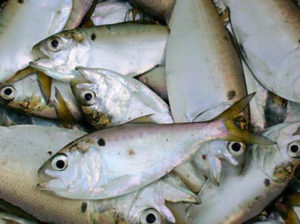Science, Not Politics, Should Guide Management of Menhaden
By Steve Kline, Theodore Roosevelt Conservation Partnership
from the Fishing Wire

Menhaden baitfish
Virginia should do the right thing and let experts guide the future of bunker, says this national conservation group.
Hunting and fishing traditions have deep roots in Virginia—residents have a constitutional right to hunt, and more than 800,000 anglers a year turn out to fish the same waters that George Washington did. But Virginia is also the only state along the Eastern Seaboard that still allows the commercial reduction fishing of Atlantic menhaden, a critical forage fish.
The last holdout of an antiquated fishing industry, reduction fishing of menhaden—or bunker, as you’ll often hear them called on docks around the Chesapeake—involves the harvest of billions of tiny fish that are then reduced to meal and oil for use in a variety of applications, from food for farmed salmon to cosmetics.
There may be many uses for menhaden outside the water, but their real economic and ecological value comes from keeping them in the water.
Atlantic menhaden comprise the very foundation of a diverse ecosystem, which includes some of the most popular gamefish species in the world. From a fisheries management standpoint, it doesn’t get any simpler than this: Fewer menhaden in the water means fewer striped bass, bluefish, cobia, redfish, and weakfish. And that means the potential collapse of a recreational fishing economy worth far more than any reduction fishery.
However, as the sea fog recedes, it becomes clear why Virginia allows this practice to continue.
The commonwealth manages menhaden not through its science-based Virginia Marine Resources Commission, but rather through its state legislature. It begs the question, if the commission is good enough to manage all the other marine fish stocks in the state, both recreational and commercial, why isn’t it being permitted to do its job when it comes to menhaden?
It’s clear to us that Virginia should not allow this reduction fishery to continue while risking the future of the state’s recreational fishing economy. State legislatures are no place to manage species, and if the Marine Resources Commission is good enough to manage striped bass, they ought to be managing what stripers eat, too.
Science should always guide fisheries management decisions to the greatest extent possible. It’s not realistic to take the politics out of the equation completely, but the state of Virginia needs to stop letting politics be the only guiding force in the management of menhaden.
Read more conservation features at www.trcp.org.